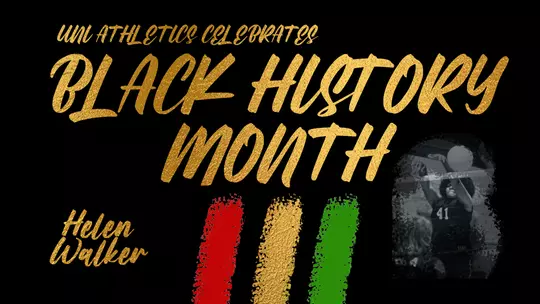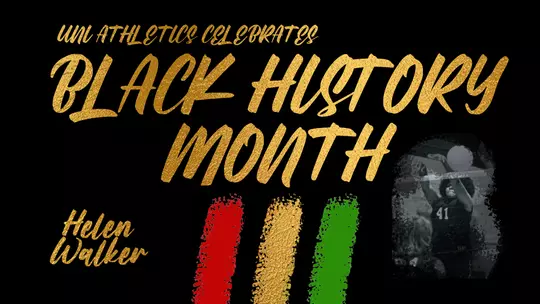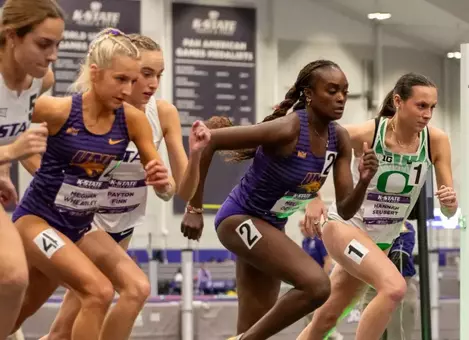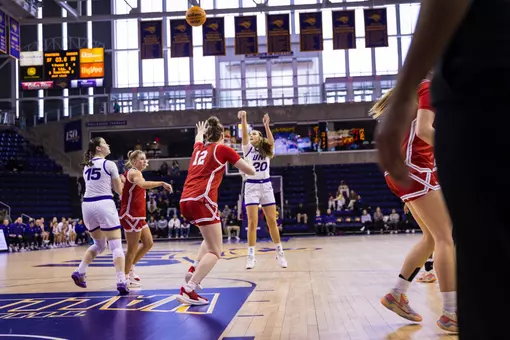
UNI Celebrates Black History Month - Helen Walker
2/22/2021

Former UNI three-sport athlete Helen Walker has always had something to prove. Whether it was facing discrimination during her athletic career, her experiences teaching in inner-city Chicago or being a public school administrator, Walker has overcame many obstacles in her life and has helped many others do the same. Having experienced tough situations in her own right, Walker has been able to use these experiences for the better and done everything in her power to make the world a better place.
Originally from Joliet, Ill, Walker had many connections to Iowa growing up. Her mother and grandmother were born in Iowa City and her aunt was from neighboring Waterloo. Having many family connections to the Eastern Iowa area, Walker found that UNI would be a great fit for a college education.
As she prepared for her college experience, Title IX passed in 1972, drastically changing the landscape of women’s sports, though it took years for the changes to take effect. Scholarships were still not offered at UNI when Walker came to campus.
She tried out for three sports, but faced immediate opposition. While trying out for the women’s basketball team at UNI, Walker was faced with attempts to discourage her from ever playing collegiate basketball.
I wanted to prove them wrong. Me being there opened the doors for other people as well. It helped me become a better player, kind of like having a target on my back. But I embraced it and told myself ‘I can do this.’Helen Walker
“I was told that you’ll never make this team, there’s never been an African-American on the basketball team before,” she said.
Many people would find the comments discouraging, but for Walker, they lit her competitive spirit to prove them all wrong.
“That was the motivation I needed. I wanted to prove them wrong. Me being there opened the doors for other people as well. It helped me become a better player, kind of like having a target on my back. But I embraced it and told myself ‘I can do this.’”
Walker had somewhat of a competitive advantage as well, growing up with an athletic family and being from Illinois, who played full-court five-on-five women’s basketball (Iowa played six-on-six basketball until 1993, which included three frontcourt and three backcourt players, but they couldn’t play full court).
“I spent a lot of time playing sports with brothers and cousins. It prepared me for collegiate basketball, and I played a lot freshman year, initially as a starter and then became 6th man. I played all three positions too.”
Walker still experienced discrimination even after making the women’s basketball team. During her senior year, she was voted by her teammates to be the team captain. However, the head coach of the team then decided that the team would have rotating captains for each game, which had never been done before.
“I was offended,” said Walker. “The teammates had always voted for who they wanted to be their captain, but when I was voted captain my senior year my coach took an issue with it and instituted a captain rotation for the games. So I confronted the coach and the decision was eventually rescinded. But I still took offense since I was the only Black player on the women’s basketball team.”
Walker was also a champion for women’s rights in athletics during her time at UNI. She served as a student representative on a committee to advocate for women’s scholarships in collegiate athletics. This had been right after Title IX was implemented nationwide and eventually the policy of offering women’s scholarships for athletics was put into place.
Walker was the leading scorer and rebounder on the UNI women’s varsity basketball team for three years and was named team captain for the 1977-78 season. She participated on the track team and competed in discus throw and long jump in the Regional Championships and ran in the 4x100 and 4x200/800 relays. She also played on the UNI volleyball team for two years.
Upon graduation from UNI, Walker moved back to the Chicago area, where she tried out for a professional women’s team. She ultimately was offered a contract but did not accept because it did not pay enough money. She soon went to work for City Colleges of Chicago as an administrator. One of her proudest accomplishments was providing academic support for teenage mothers and helping them find careers.
“We helped them get into a career program to go from public assistance to independence. We had many success stories of women who would become social workers, nurses and other careers,” said Walker.
Walker then earned a promotion to work at Truman College and became the head of department overseeing all eight colleges, instead of just one campus.
After several years as an administrator for City College of Chicago, Walker then moved into a teaching position. She initially took a job as a substitute teacher and was asked on her first day “could you come back for the rest of the year?”
Walker then taught in the Chicago Public School system for 12 years, primarily as a physical education teacher. She also coached girls basketball, volleyball and served as an assistant coach on the boys basketball team.
Stepping into a teaching role “was the hardest job I ever had,” according to Walker. “I taught in a high poverty, high crime area. Students would come to class without shoes or coats. I had to buy them food or deodorant sometimes. Most of these schools are underfunded and understaffed. We would have drills for drive-by shootings some days. You would get a lot of violence and behavioral issues, which takes a lot of your time and energy, and not as much for teaching,” she said.
Having a passion for improving the lives around her, Walker dedicated her life to the cause of education. While simply one woman can’t do everything, Helen Walker would be the closest possible example of how one person can change the world for the better.




